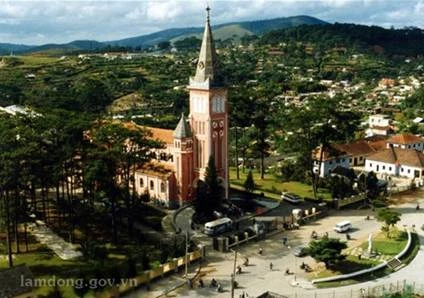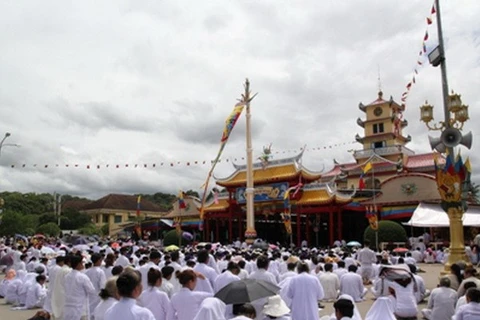All religions and beliefs in Vietnam have received the freedom they need to develop, according to Pham Dung, Deputy Minister of Home Affairs and Head of the Government Committee for Religious Affairs.
Since the birth of modern Vietnam in 1945, the Party and State have continually paid attention to religions and beliefs, and implemented a consistent policy of ensuring the freedom of belief, unifying followers of different religions as well as followers and non-followers.
The policy has been institutionalised in the Constitution and other legal documents.
The country’s first Constitution in 1946 stated that all people have the freedom of belief. In the same vein, the 2013 Constitution stipulates that everyone has the right to freedom of belief and religion, and has the right to follow any religion or to follow no religion. All religions are equal before law. The State shall respect and protect the freedom of belief and religion, and no one may violate the freedom of belief and religion, nor may anyone take advantage of a belief or religion in order to violate the law.
Specially, Decree No 234-SL issued on June 14, 1955 signed by President Ho Chi Minh was the first most complete legal document in this realm, which specified that the freedom of religion, belief and worship is a right of the people, which the democratic republic administration always respects and facilitates its enforcement (Article 15).
President Ho Chi Minh always gave special attention to religious issues and the respect of the freedom of religion; he wrote hundreds of articles on the matter, emphasising national unity among religions is the decisive factor to the success of Vietnam’s revolutionary cause and the existence of the nation.
Entering the era of reform, door opening and international integration, many policies and guidelines on religion were issued which clearly show respect for the freedom of religion and belief.
The implementation of the Party’s and State’s policies on religious affairs played an important part in socio-economic and cultural reforms, fuelling tremendous achievements in the country’s development.
State management of religion and belief has always followed the policy that ‘religions are shoulder to shoulder with the nation,’ motivating followers and dignitaries to lead a good life and make the religious life in Vietnam more diverse and lively.
The positive impacts of religious policies can be seen in the rapid and strong development of each religion in Vietnam.
In 1985, Vietnam had 14 million religious followers and 35,000 dignitaries but only five years later the numbers increased to 15 million and 38,000, respectively.
In 2000, the country had 20 million followers and 55,000 dignitaries. The numbers for 2014 were 24 million followers and 87,000 dignitaries.
Vietnam once had only a few training facilities run by Buddhist and Catholic organisations, but the number has multiplied. Buddhism alone boasts four academies, eight colleges and 32 schools. The Catholic Church runs 7 schools. Other religions also have their own schools.
According to data from the Government’s Committee for Religious Affairs, religions in Vietnam had nearly 60 establishments to train dignitaries in 2015 and around 1,000 religious dignitaries had studied overseas in master’s and doctorate programmes as of 2014, 650 of whom were Buddhists.
Since the reforms, more than 80 percent of religious worship facilities, or 21,000 out of 26,000 worship facilities, have been renovated, one third of which were large-scale renovations. From 2010-2011 alone, the country built 500 new worshipping facilities and conducted large-scale upgrades to 600 others.
In order to preserve and promote the unique characteristics of Buddhism and Khmer people, the government and the Vietnam Buddhist Sangha chapters in provinces and cities have assisted in the renovation of pagodas of the Theravada Buddhism in Vietnam.
Most pagodas have been renovated with their architectural characteristics kept intact. A replica of the Khleang pagoda was built at the Cultural and Tourism Village in Dong Mo, Son Tay town of Hanoi.
Religious practices have made the spiritual life in Vietnam more diverse. Besides the belief in ancestors, the Mother Goddess and the God of the Village, millions of Vietnamese are under the influence of Buddhism, which can be seen in the custom of visiting pagodas at the beginning of the year or the practice of Le Vu Lan (Filial Piety ceremony, or Ghost festival).
At the same time, major religious events held in the past decades have attracted a large number of followers and non-followers, boosting confidence in the Party and State’s consistent policies on freedom of religion.
Among them were celebrations of the Vesak, also known as Buddha Purnima and Buddha Day, in 2008 and 2014, and Catholic Jubilee Year 2010.
The 100th anniversary of the arrival of Protestantism in Vietnam was marked with ceremonies in 2011 in Da Nang, Hanoi and HCM City with the participation of dozens of thousands of followers, dignitaries and international visitors.
Religious communities have positively participated in society and unified with all other social groups to support the Party and State in policies and guidelines on national construction and defence.
In 2014, when China installed drilling platform Haiyan 981 in the country’s exclusive economic zone and continent shelf, the Buddhist Sangha of Vietnam, the Catholic Church and other religions issued statements and carried out practical actions to support the Party and State in protecting sea and island sovereignty.
Religious organisations also took part in social activities in health, education and humanitarian aid, contributing to social welfare and reducing the burden on the State.
Religious life in Vietnam has advanced positively and progressively since the reforms. The changes have proved the Party and State’s religious policies and encouraged religious communities to play an increasingly proactive role in the reform cause, thus helping stabilise the political situation and promote the country’s development, while serving as evidence to counter false accusations on Vietnam’s religious situation and policies.-VNA

Central Highlands facilitates religious practices
Central Highlands provinces have effectively implemented policies on religion, creating all possible conditions for local residents, especially those from ethnic groups, to practise their religions.
























